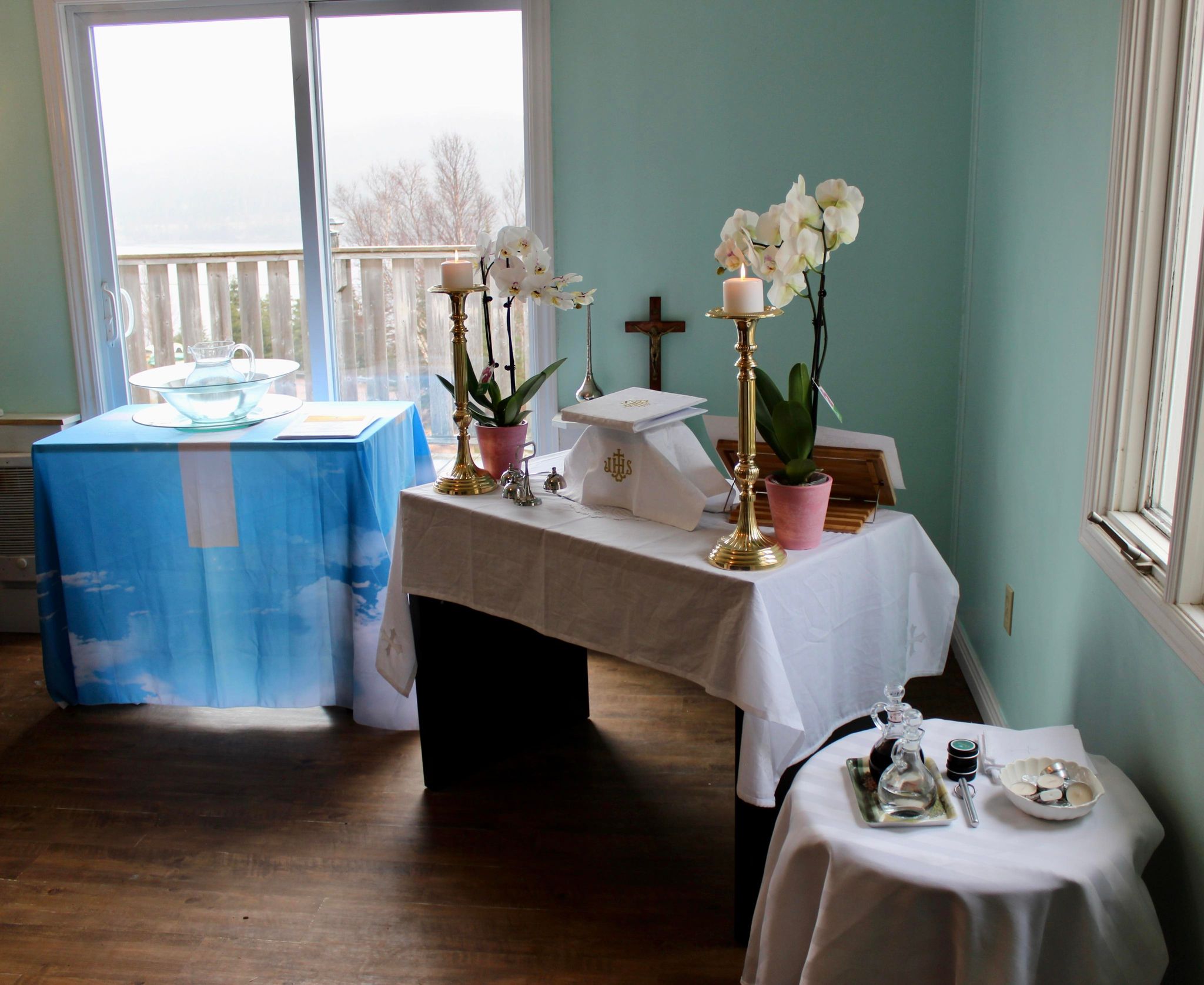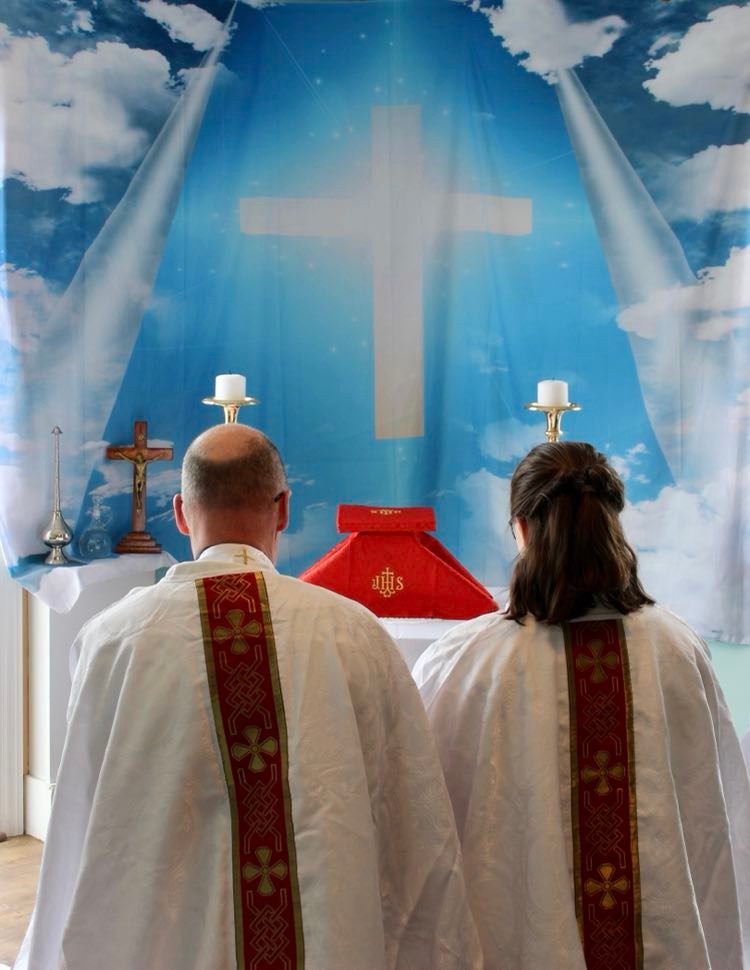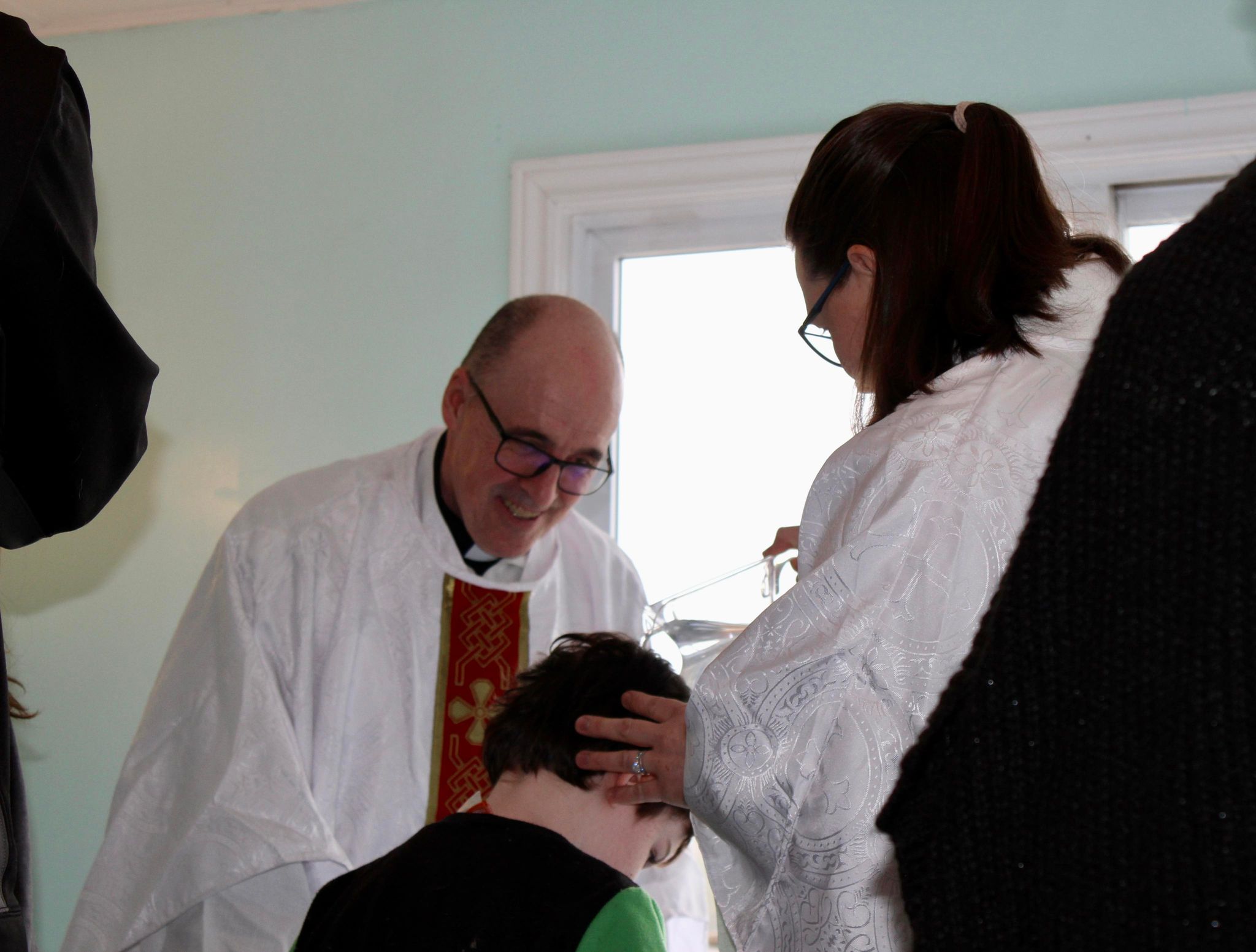- Home
- about stbrigits
- Choose St. Brigit's Community Catholic Church
Simply Catholic and Welcoming You
Why Choose St. Brigit’s Community Catholic Church?

A Home Altar, Credence Table and Baptismal Font Set Up For Mass and a Catholic Baptism
Why choose St. Brigit’s Community Catholic Church? Perhaps because of our practices which flow directly from our church canons. Our practices are how we implement our specific expression of our Catholic faith. Elsewhere on this site we have written about how we differ from our Roman Catholic brothers and sisters even while pointing out that they are the ‘branch’ of Catholicism we most closely resemble
Perhaps you would choose St. Brigit’s Community Catholic Church for our specific charism or because you embrace our church canons, both posted elsewhere on this website.But I think it’s how we practice our faith that ought to be of most interest to investigators.
I would like to outline a distilled or bare bones version of the St. Brigit’s Community Catholic Church practices, without digressing into comparisons with other Catholic Rites or other Christian denominations. Simply to show our daily implementation of how we express our faith.
I think people will choose St. Brigit’s Community Catholic Church because we seek to grow our community by focusing on inclusivity, progressive values, and open dialogue, potentially attracting those who may feel disconnected from traditional Catholic teachings as well as those Catholics and others now left without a place of worship. This approach involves emphasizing community, accepting diverse perspectives on issues like LGBTQ+ inclusion and women's roles, and fostering a welcoming environment for all, regardless of denominational background.
We believe this approach suggests a path towards a more inclusive and welcoming form of Catholicism/Christianity.
For those of our readers who may not wish to read a 2000+ word page let me start by simply listing our practices in point form. Those who still want to read more details on each point may then choose to keep reading as we expand on each point further down the page.
Choose St. Brigit’s Community Catholic Church for our Practices of;

Archbishop Philip and Bishop Charlene Bradley, Husband and Wife Who Are Both Bishops, Genuflect Before the Altar Prior to Co-celebrating Catholic Mass
1. Financial transparency
2. Eligibility of all persons to clergy callings
3. Confession that “decriminalizes sin” focusing on repairing relationships with God and self
4. Mandatory reporting for addressing various abuses
5. Adaptation of the liturgy according to local cultures.
6. Non-opulence and simplicity in expression, vestments and accouterments.
7. Communion for the divorced and remarried
8. No vows of celibacy.
9. De-empathize clergy titles
10. No aggressive proselytization.
11. Homilies focus on Love and Salvation not on damnation and fear.
12. Clergy are unpaid by the church
13. Universal welcome at the altar.
14. The Gospel of Christ is a mandate of mercy, love and forgiveness not a judicial assignment of fault or guilt.
15. The church is the people of Christ and buildings are just buildings
16. We cannot logically adore the Creator and disrespect Creation
17. Family planning and abortion are to be considered in the totality of the individual's circumstances and personal conscience.
18. We find no grounds to accept the concept of Purgatory
19. We do not endorse prayers that include even biblical quotes praying for “harm to enemies or heathens”
20. Marriage is the exchange of vows between two people, before God and witnesses to bless and celebrate a loving, committed relationship between two people.
21. Scriptures are not tools for exclusion nor to be argued over.
22. The bulk of our beliefs are nicely summed up in the Apostles' Creed and the Nicene Creed.
23. We also hold firmly to (Matt. 7:1) ‘’Judge not lest ye be judged.’’
24. All Catholic Rites possessing full Apostolic Succession and valid priesthood orders are equal in validity and dignity.
25. We view other denominations as simply differing expressions of that same faith which we espouse.
26. Inclusivity
27. Progressive Values
28.Open Dialogue
29. Community Building
30. Relevance
31. Respect for Individual Conscience
Choose St. Brigit’s Community Catholic Church - Our Practices in Detail

A Young Boy Being Baptized. We Will Baptize Infants at Their Parents Request but Prefer That the Candidate be At Least 11 Years old and Making Their Own Choices Towards The Faith.
1. Financial transparency
We specifically choose to operate as a not for profit organization with our finances open to review not only by our government and our own directors but also open to the public. It isn’t enough to say we are not to be a burden to our congregations, it needs to be clear to any who choose to look into our organization that we do indeed operate in a manner that holds to that claim.
2. Eligibility of all persons to clergy callings
At St. Brigit’s Community Catholic Church, we mean it when we say that our goal is to see clergy in every household. There are some restrictions that, obviously, we cannot and should not ‘get around’.
There are those people whose criminal convictions or mental health indicate they are unsafe to have around young people or vulnerable persons. Some people are only interested in being clergy for the perceived status and/or income potential. Many people have no interest in becoming clergy, at least as they have historically known clergy to be.
With these things in mind, we, as a church, do not place false restrictions on eligibility to be ordained or consecrated. We freely welcome any sincere person regardless or race, colour, gender or gender orientation, marital status or level of ‘ability’ or ‘disability’, even financial standing to answer God’s call to serve in their own home or publicly to advance His Divine Commission to bring His Salvation to all people.
3. Confession that “decriminalises sin” focusing on repairing relationships with God and self
Confession is a choice people make when they feel the need to be specifically absolved of their sins and repair their relationship with the Divine. It is never to be a judgmental process. It is a coming home to the God of Love to love and be loved by Him.
4. Mandatory reporting for addressing various abuses
It is a St. Brigit’s Community Catholic Church practice to report sexual and other abuses to our civil authorities forthwith and allow those trained and tasked with the relevant investigations to conduct such investigations and proceed with the appropriate course of action without our personal or church bodies interference. Interference with such matters is itself a crime.
It is our view that clergy, bishops and other officials who cover up abuse, especially those who relocate clergy only to provide them with a whole new ‘victim pool’, become complicit in the abuse cycle and should be charged with criminal complicity.
5. Adaptation of the liturgy according to local cultures.
In St. Brigit’s Community Catholic Church the Roman/Latin, Anglican, Lutheran and non-denomination Rites are each approved for use by clergy as best fits the needs of specific congregations and clergy members. Should we ever have independent clergy from other Catholic Rites join with us, then their specific Rite would also be approved (examples; Celtic or Orthodox).
6. Non-opulence and simplicity in expression, vestments and accouterments.
As detailed elsewhere on this site, we fully understand the need for crosses, statuary, vestments, symbols of office, etc. What we do not understand and cannot condone is the unwarranted amounts of money, spent on such things that would better be spent to house the homeless, feed the poor, provide medications or any of the myriad other charitable works we are called to do as Christians.
Less expensive options are just as valid and acceptable to fulfill the needs in Rites, rituals and sacramental duties. When we say that we are “simply Catholic” we mean in faith, expression and ritual. Waste equates to leaving someone in need without service.
7. Communion for the divorced and remarried
We have no need nor expectation for an annulment nor do we hold remarriage as a reason to forbid receiving the sacraments including the Holy Eucharist.
8. No vows of celibacy.
Old Catholics and Orthodox Catholics always viewed enforced celibacy as unnatural and inviting problems. Time has proven this view to be all too accurate.
9. De-empathize clergy titles
At St. Brigit’s Community Catholic Church we prefer using only Reverend, Father, Mother/Amma, Bishop or Your Grace and all can be appropriately called simply Father or Mother without disrespect. We seek to serve, not gain status.
10. No aggressive proselytization.
We invite, we do not coerce. In claiming our right to practice our faith and express that faith as we uniquely see fit we must, by simple logical extension accept that all others have that same inherent right. Further, we see denominations as differing expressions of the same Christian faith which we espouse, not something to argue over.
11. Homilies focus on Love and Salvation not on damnation and fear.
Christ never used fear tactics, why then do so many supposed Christians employ them? Light and Love are Christ’s tools. Darkness and fear are the realms of the Enemy. We choose to only follow the example of Christ to carry His message of Love and Salvation.
12. Clergy are unpaid by the church
This is in keeping with our mandate to not be a burden to our congregations and totally in keeping with the hope to one day have clergy in every home. To accomplish that goal we must first set the example that this is possible by running our home, holding our careers and being clergy. Exactly as we are asking others to do.
13. Universal welcome at the altar.
The Eucharist is not a prize for the perfected, it is medicine for the sick. At St. Brigit’s Community Catholic Church, Christians from any and all denominations and all youth up to twelve years of age who can respectfully receive the Eucharist are invited to do so. Remember, we will baptize any age child at the parents request but see no “need” for baptism until the child is eleven and mature enough in the faith to choose for themselves.
Persons twelve years and older do need to have been baptized into some Christian denomination in order to partake of the Eucharist.
14. The Gospel of Christ is a mandate of mercy, love and forgiveness not a judicial assignment of fault or guilt.
This shows through in many ways. In our loving acceptance and ministry to the addicted, the convicted, the apostates, the sick, the marginalized and the outcasts, all are our brothers and sisters in Christ.
15. The church is the people of Christ and buildings are just buildings
At St. Brigit’s Community Catholic Church we look to the people of Christ as the church not buildings. We happily worship in our homes, community centers, outside and in church buildings. We are not opposed to having buildings as places of worship but prefer even such buildings to serve as multi-purpose buildings rather than sitting empty six days a week. Also we prefer house sized buildings not massive structures as so many places of worship are.
16. We cannot logically adore the Creator and disrespect Creation
Thus the earth He gave us is to be cherished not destroyed. Respected, not trashed. Cherished and loved as our home with the earth’s resources respected and shared for the greater good of all.
17. Family planning and abortion are to be considered in the totality of the individual's circumstances and personal conscience.
A blanket statement cannot logically be applied to every circumstance or situation. Logic, love and mercy must always be factored into any such decisions.
18. We find no grounds to accept the concept of Purgatory
Of all the Catholic Rites/churches, only the Latin/Roman Catholic Church promotes this concept. We find it an unbelievable stretch to attempt to claim this doctrine as being biblically based and thus reject it completely. Again this is promoting a fear to take advantage of people or to control them. Both of which tactics we reject outright.
19. We do not endorse prayers that include even biblical quotes praying for “harm to enemies or heathens”
This practice tends to occur in many prayer services and prayer observances including the Divine Office. Christ taught us to Love even our enemies. You cannot claim to love while praying harm.
We alter such prayers to be consistent with Christ’s admonition to us. We do not alter the original scripture as they are sacred records of the Jewish people whose sentiments and prayers were consistent with their circumstances and beliefs. So, history remains yet, moving forward we now follow the example set by Christ which is to pray FOR our enemies and those who despite-fully use us. Surely the opposite of praying harm upon them (essentially a curse).
20. Marriage is the exchange of vows between two people, before God and witnesses to bless and celebrate a loving, committed relationship between two people.
Regardless of gender, race, colour, denomination, in some cases even where the couple hold different religions.
21. Scriptures are not tools for exclusion nor to be argued over.
Christ fulfilled the “law and the prophets”. He taught universal, non-judgemental Love. We follow the Gospels accounts of Christ’s instructions to us. Scriptures also tell us that "Only by pride cometh contention".Proverbs 13:10
22. The bulk of our beliefs are nicely summed up in the Apostles' Creed and the Nicene Creed.
23. We also hold firmly to (Matt. 7:1) ‘’Judge not lest ye be judged.’’
24. All Catholic Rites possessing full Apostolic Succession and valid priesthood orders are equal in validity and dignity.
This is confirmed in the Canons of each Catholic Rite/Church and is echoed in our common belief in “The One, Holy, Catholic and Apostolic Church.”
25. St. Brigit’s Community Catholic Church welcomes Christians of all denominations and embraces the concept of the "One, Holy, Catholic and Apostolic church," while honoring denominational differences.
We view other denominations, not just other Catholics, as simply differing expressions of that same faith which we espouse.
26. Inclusivity
At St. Brigit’s Community Catholic Church we embrace diversity within the church, welcoming people of all backgrounds, including LGBTQ+ individuals and those with differing views on traditional Catholic teachings.
27. Progressive Values
We seek to actively engage with contemporary social issues, such as social justice, environmentalism, and poverty, and demonstrate a commitment to applying Catholic social teaching to these challenges.
28.Open Dialogue
We work to create spaces for open and honest conversations about faith, beliefs, and the role of the church in the modern world.
29. Community Building
We strive to foster a strong sense of community through shared activities, social events, and opportunities for mutual support.
30. Relevance
We connect faith to daily life, demonstrating how Christian values can inform and enrich personal and social well-being.
31. Respect for Individual Conscience
We very much emphasize the importance of individual discernment and conscience, rather than strict adherence to dogma.
Recent Articles
-
The Basic Catechism of the Catholic Church
Feb 12, 26 11:03 AM
A basic catechism of any rite or branch of the catholic church acts as a primary reference for teaching the faith -
The Divine Office
Feb 07, 26 11:07 AM
The Divine Office The Divine Office, also known as the Liturgy of the Hours or Opus Dei ("Work of God"), is the official, daily set of prayers of the Catholic Church -
Women Being Removed or Voided from Scriptures
Jan 17, 26 05:06 PM
The concept of women being "removed" or "voided" from scriptures refers to both the physical exclusion of female narratives in historical texts...
Boat Harbour West, Newfoundland, Canada. Cell Number 709-276-0626
Join Us Also on Our St. Brigit's Community Catholic Church Prayer group on Facebook: https://www.facebook.com/groups/324523956473448


